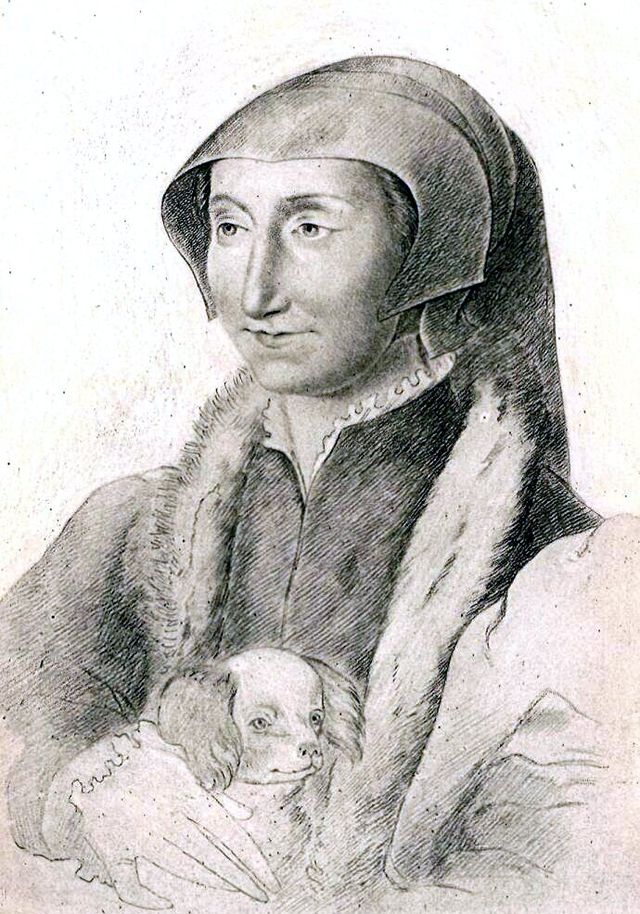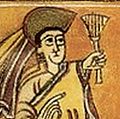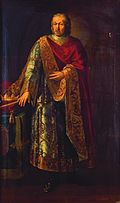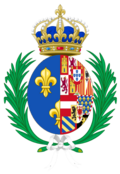List of Navarrese royal consorts
From Wikipedia, the free encyclopedia
This is a list of those men and women who have been royal consorts of the Kingdom of Navarre. Because the laws of Navarre did not prohibit women from inheriting the crown, on a number of occasions, the Kingdom was inherited or transmitted via heiresses. Thus, whilst most of the royal consorts were women, who held the title of queen consort, several were men,[which?] who by their marriages held the title of king, and who are given regnal designations in the lists of Navarrese kings and queens regnant.
This article needs additional citations for verification. (August 2023) |

Most of these men, although granted power through marriage rather than through inheritance, nonetheless were significant or dominant in their marriages and the rule of the country; indeed, one king by marriage, John II of Navarre (who would late in life also become John II of Aragon by rightful inheritance), husband of Blanche I of Navarre, refused to surrender the crown following her death to their son, Charles of Viana, the rightful heir to the Kingdom, instead retaining the power for himself.
Vicissitudes of the crown
Summarize
Perspective
From 1285 to 1328, the crowns of Navarre and France were united by virtue of the marriage of Joan I of Navarre, queen regnant of Navarre and queen consort of France, to King Philip IV of France (who became king-by-marriage of Navarre), and by the succession of their three sons, Louis I/X, Philip II/V, and Charles I/IV. Thus, the wives of these three Kings were Queen-consort of both France and Navarre. However, the inheritance of Navarre by Philip II/V and Charles I/IV following the death of Louis I/X, and his son John I, was, strictly speaking, against the laws of Navarre: that realm did not employ salic law, meaning that the Kingdom should have passed to Jeanne, heiress of Louis, rather than to Philip, the next male heir of Joan I. However, Jeanne being a young child still, and her uncles being of Navarrese blood, she was denied her rights until the death of Charles in 1328, at which point the male line of Joan I died out, and Jeanne was allowed to inherit Navarre. Her husband, Philip of Évreux, became King Philip III of Navarre with his wife due to this.
Thereafter, Navarre on several occasions experienced an extinction of its ruling male line, and consequent absorption or inclusion in the lands of other families. In most cases, the beginning of a new dynasty in Navarre was preceded by the father of the new monarch serving as royal consort—the exception being the De Foix family, none of whom ever served as Navarrese consorts (due to the death of Gaston IV, Count of Foix prior to the inheritance of his wife).
In 1512–13, Upper Navarre, the portion of the Kingdom below the Pyrenees and the independent portion of the Kingdom from which the crown derived, was occupied by Spanish forces under Ferdinand the Catholic, the son of John II, and husband of Germaine de Foix (an heiress of Navarre), driving out the king and queen, John III and Catherine I. Ferdinand was proclaimed King of Navarre by the cortes there; his wife became queen consort of the realm, and thereafter the de facto queens consort of Navarre are identical with the queens consort of Spain. John and Catherine maintained claims to Navarre, which were inherited by their heirs, and their line continued to use the titles of King and Queen of Navarre; however, all that remained to them were the feudal lands they held from the French crown, and they ceased to be monarchs other than by right.
The final dynastic change was the marriage of Jeanne III to Antoine de Bourbon, an heir to the French throne, and the subsequent succession to the throne of their son, Henry III. He later became King of France as Henry IV, and French and Navarrese queens consort once again become one and the same. However, the Navarrese crown and lands were merged into the French crown in 1620, and thereafter the French queens consort, though honorifically still queens consort of Navarre, ceased to be so in any real sense.
House of Íñiguez (c. 824 – 905)
| Name | House | Birth | Marriage | Became Consort | Coronation | Ceased to be Consort | Death | Spouse |
|---|---|---|---|---|---|---|---|---|
| perhaps Urraca | García Íñiguez | |||||||
| Auria | 880 | Fortún Garcés the One-Eyed | ||||||
| Name | House | Birth | Marriage | Became consort | Coronation | Ceased to be consort | Death | Spouse |
House of Jiménez (905–1234)
| Picture | Name | Father | Birth | Marriage | Became Consort | Coronation | Ceased to be Consort | Death | Spouse |
|---|---|---|---|---|---|---|---|---|---|
| Toda Aznárez | Aznar Sánchez, Lord of Larraún (Íñiguez) |
885 | - | 905 husband's accession |
- | 11 December 925 husband's death |
after 970 | Sancho I Garcés | |
| Sancha Aznárez (uncertain) |
Aznar Sánchez, Lord of Larraún (Íñiguez) |
- | - | - | - | Jimeno Garcés | |||
| Andregoto Galíndez | Galindo Aznárez II, Count of Aragon (Aragon) |
900s | after 9 March 933 | - | 940 repudiated |
972 | García Sánchez I | ||
| Theresa of León | Ramiro II of León (Astur-Leonese) |
928 | 943, or before | - | 22 February 970 husband's death |
after September 957 | |||
 |
Urraca Fernández | Fernán González, Count of Castile (Castile) |
920/35 | 962 | 22 February 970 husband's accession |
- | December 994 husband's death |
after 1007 | Sancho II Garcés Abarca |
| Jimena Fernández | Fernando Bermúdez de Cea | 970s | by August 981 | December 994 husband's accession |
- | 1004 husband's death |
after 1035 | García Sánchez II | |
| Muniadona | García Sánchez, Count of Castile (Castile) |
990/5 | before 27 June 1011 | - | 18 October 1035 husband's death |
after 13 July 1066 | Sancho III Garcés | ||
| Stephanie | Ramon Borrell, Count of Barcelona or Bernard-Roger, Count of Bigorre |
- | 1038 | - | 1 September 1054 husband's death |
after 1066 | García Sánchez III | ||
| Placentia | of French or Norman origins | - | after 1068 | - | 4 June 1076 husband's death |
after 14 April 1088 | Sancho IV Garcés | ||
| Felicia of Roucy | Hilduin IV, Count of Roucy (Montdidier) |
1060 | 1076 | - | 4 June 1094 husband's death |
3 May 1123 | Sancho V Ramírez | ||
| Agnes of Aquitaine | William VIII, Duke of Aquitaine (Ramnulfids) |
end 1072 | January 1086 | 4 June 1094 husband's accession |
- | 6 June 1097 | Peter I | ||
| Bertha of Aragon | of Italian origins | 1075 | 16 August 1097 | - | 28 September 1104 husband's death |
before 1111 | |||
 |
Urraca of León and Castile | Alfonso VI of León and Castile (Jiménez) |
April 1079 | October 1109 | - | 1115 marriage annulled |
8 March 1126 | Alfonso I | |
| Margaret of L'Aigle | Gilbert of L'Aigle | 1104 | after 1130 | 1134 husband's accession |
- | 25 May 1141 | García Ramírez | ||
| Urraca the Asturian | Alfonso VII of León and Castile (Ivrea) |
1132 | 24 June 1144 | - | 21 November 1150 husband's death |
26 October 1164 | |||
| Sancha of Castile | Alfonso VII of León and Castile (Ivrea) |
1139 | 20 July 1153 | - | 5 August 1177 | Sancho VI Garcés | |||
| Constance of Toulouse | Raymond VI, Count of Toulouse (Rouergue) |
1180 | 1195 | - | 1200 marriage annulled |
after 12 May 1260 | Sancho VII Sánchez | ||
House of Champagne (1234–1284)
| Picture | Arms | Name | Father | Birth | Marriage | Became Consort | Coronation | Ceased to be Consort | Death | Spouse |
|---|---|---|---|---|---|---|---|---|---|---|
 |
 |
Margaret of Bourbon | Archambaud VIII of Bourbon (Bourbon-Dampierre) |
1211 | 22 September 1232 | 7 April 1234 husband's accession |
- | 8 July 1253 husband's death |
12 April 1256 | Theobald I |
 |
 |
Isabella of France | Louis IX of France (Capet) |
2 March 1241 | 6 April 1255 | - | 4 December 1270 husband's death |
17 April 1271 | Theobald II | |
 |
 |
Blanche of Artois | Robert I, Count of Artois (Artois) |
1248 | 1269 | 4 December 1270 husband's accession |
- | 22 July 1274 husband's death |
2 May 1302 | Henry I |
House of Capet (1284–1349)
| Picture | Arms | Name | Father | Birth | Marriage | Became Consort | Coronation | Ceased to be Consort | Death | Spouse |
|---|---|---|---|---|---|---|---|---|---|---|
 |
 |
Margaret of Burgundy | Robert II, Duke of Burgundy (Burgundy) |
1290 | 23 September 1305 | -[1] | 14 August 1315 | Louis I | ||
 |
 |
Clementia of Hungary | Charles Martel of Anjou (Anjou) |
February 1293 | 19 August 1315 | 24 August 1315 | 5 June 1316 husband's death |
12 October 1328 | ||
 |
 |
Joan II, Countess of Burgundy | Otto IV, Count of Burgundy (Chalon) |
15 January 1292 | January 1307 | 20 November 1316 husband's accession |
9 January 1317 | 3 January 1322 husband's death |
21 January 1330 | Philip II |
 |
 |
Blanche of Burgundy | Otto IV, Count of Burgundy (Chalon) |
1296 | 20 May 1308 | 3 January 1322 husband's accession |
Never crowned[2] | 19 May 1322 marriage annulled by the Pope |
29 April 1326 | Charles I |
 |
 |
Marie of Luxembourg | Henry VII, Holy Roman Emperor (Luxembourg) |
1304 | 21 September 1322 | 15 May 1323 | 26 March 1324 | |||
 |
 |
Jeanne d'Évreux | Louis, Count of Évreux (Évreux) |
1310 | 5 July 1325 | 11 May 1326 | 1 February 1328 husband's death |
4 March 1371 | ||
House of Évreux (1328–1441)
| Picture | Arms | Name | Father | Birth | Marriage | Became Consort | Coronation | Ceased to be Consort | Death | Spouse |
|---|---|---|---|---|---|---|---|---|---|---|
 |
 |
Joan of Valois | John II of France (Valois) |
24 June 1343 | 12 February 1352 | - | 3 November 1373 | Charles II | ||
 |
 |
Eleanor of Castile | Henry II of Castile (Trastámara) |
after 1363 | 27 May 1375 | 1 January 1387 husband's accession |
- | 27 February 1416 | Charles III | |
 |
 |
John II of Navarre | Ferdinand I of Antequera (Trastámara) |
29 June 1398 | 1419 | 8 September 1425 wife's accession |
- | 20 January 1479 | Blanche I | |
House of Trastámara (1425–1479)
| Picture | Arms | Name | Father | Birth | Marriage | Became Consort | Coronation | Ceased to be Consort | Death | Spouse |
|---|---|---|---|---|---|---|---|---|---|---|
 |
 |
Agnes of Cleves de jure |
Adolph I, Duke of Cleves (La Marck) |
24 March 1422 | 30 September 1439 | 1 April 1441 husband's accession |
- | 6 April 1448 | Charles IV de jure | |
 |
 |
Juana Enríquez de facto |
Fadrique Enríquez, Count of Melba and Rueda (Enríquez) |
1425 | 1 April 1444 | - | 13 February 1468 | John II de facto | ||
House of Foix (1483–1516)
| Picture | Arms | Name | Father | Birth | Marriage | Became Consort | Coronation | Ceased to be Consort | Death | Spouse |
|---|---|---|---|---|---|---|---|---|---|---|
 |
 |
John III of Albret | Alain I of Albret (Albret) |
1469 | 14 June 1484 | - | 17 June 1516 | Catherine I | ||
In 1512, Ferdinand II of Aragon, the Catholic, militarily conquered the Kingdom of Navarre, incorporating it in 1516 into the Crown of Castile and expelling Queen Catherine and King John. The House of Albret (1516–1572) and the House of Bourbon (1572–1620) kept using the title of King of Navarre, but ruled only a small territory north of the Pyrenees mountains. The rest of the country was ruled by the Spanish Habsburg Kings.
House of Albret (1516–1572)
| Picture | Arms | Name | Father | Birth | Marriage | Became Consort | Coronation | Ceased to be Consort | Death | Spouse |
|---|---|---|---|---|---|---|---|---|---|---|
 |
 |
Margaret of Angoulême | Charles, Count of Angoulême (Valois-Angoulême) |
11 April 1492 | 24 January 1527 | - | 21 December 1549 | Henry II only the north | ||
House of Bourbon (1572–1620)
| Picture | Arms | Name | Father | Birth | Marriage | Became Consort | Coronation | Ceased to be Consort | Death | Spouse |
|---|---|---|---|---|---|---|---|---|---|---|
 |
 |
Margaret of France | Henry II of France (Valois-Angoulême) |
14 May 1553 | 18 August 1572 | - | 1599 marriage annulled |
27 March 1615 | Henry III only the north | |
 |
 |
Marie de' Medici | Francesco I de' Medici, Grand Duke of Tuscany (Medici) |
26 April 1575 | 5 October 1600 | 13 May 1610 | 14 May 1610 husband's death |
3 July 1642 | ||
 |
 |
Anne of Austria | Philip III of Spain (Habsburg) |
22 September 1601 | 24 November 1615 | - | 20 October 1620 Navarre merged into France |
20 January 1666 | Louis II only the north | |
- For the later consorts, see the List of French royal consorts and List of Spanish royal consorts
Monarchs of Navarre since 1620
Henry III of Navarre became Henry IV of France and thereafter the crown of Navarre passed to the kings of France. In 1620, the Kingdom was merged into France, although the French kings continued to use the title King of Navarre until 1791. The title was revived from 1814 to 1830 during the Restoration. In Spain (which is the actual country to where most of the territories of historical Navarre belong), the monarch uses the title King of Navarre as part of his more extended titulary.
See also
- List of Navarrese monarchs
- List of Aragonese royal consorts
- List of Asturian royal consorts
- List of Castilian royal consorts
- List of French royal consorts
- List of Galician royal consorts
- List of Leonese royal consorts
- List of Spanish royal consorts
- List of consorts of Champagne
- List of consorts of Foix
References
Sources
Wikiwand - on
Seamless Wikipedia browsing. On steroids.
